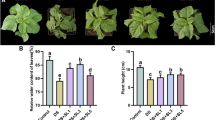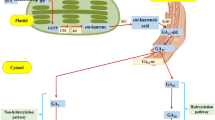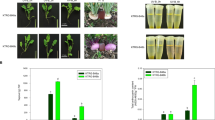Abstract
As unique secondary metabolites of Ginkgo biloba L. and relics of Ginkgoaceae, terpene trilactones (TTLs) possess great medicinal value. In this study, we investigated the effects of ultraviolet (UV) irradiation, cold stress (4 °C), and exogenous hormone treatment on TTLs and key genes expression in ginkgo leaves in annual potted ginkgo seedlings subjected to different stress treatments. The processing conditions were as follows: UV treatment (1500 μJ/m2) for 0, 8, 16, 24, and 48 h; cold stress at 4 °C, 400 µmol photons m−2 s−1; 100 μM abscisic acid (ABA); 100 μM methyl jasmonate (MeJA); 10 mM salicylic acid (SA); and 10 mM ethephon (ETH) treatments for 0, 2, 4, 6, and 8 days. Results of evaporative light-scattering detector–high-performance liquid chromatography showed that UV, cold stress, ABA, SA, MeJA, and ETH treatments increased the TTL content at various levels and up to 21.9%. The relationships among the expression levels of the key enzyme genes GbDXS, GbGGPPS, GbLPS, and GbMVD in the TTL biosynthesis pathway were also analyzed. Changes in the TTL content and expression levels of the key genes were significantly and positively correlated with TTL content. UV, cold stress, ABA, SA, MeJA, and ETH were found to increase the TTL content by upregulating the expression of the key genes. This study aimed to reveal the molecular mechanism through which TTLs are synthesized. The results can also provide theoretical guidance for the application of treatment methods to increase TTL content.









Similar content being viewed by others
References
Buhaescu I, Izzedine H (2007) Mevalonate pathway: a review of clinical and therapeutical implications. ClinBiochem 40:575–584. https://doi.org/10.1016/j.clinbiochem.2007.03.016
Chen QW, Yan JP, Meng XX, Xu F, Zhang WW, Liao YL, Qu JW (2017) Molecular cloning, characterization, and functional analysis of acetyl-CoA C-acetyltransferase and mevalonate kinase genes involved in terpene trilactone biosynthesis from Ginkgo biloba. Molecules 22:74. https://doi.org/10.3390/molecules22010074
Diamond BJ, Bailey MR (2013) Ginkgo biloba: indications, mechanisms, and safety. Psychiatr Clin North Am 36:73–83. https://doi.org/10.1016/j.psc.2012.12.006
Dong J, Wan G, Liang Z (2010) Accumulation of salicylic acid-induced phenolic compounds and raised activities of secondary metabolic and antioxidative enzymes in Salvia miltiorrhiza cell culture. J Biotechnol 148(2–3):99–104. https://doi.org/10.1016/j.jbiotec.2010.05.009
Gong YF, Liao ZH, Guo BH, Sun XF, Tang KX (2006) Molecular cloning and expression profile analysis of Ginkgo biloba DXS gene encoding 1-deoxy-D-xylulose 5-phosphate synthase, the first committed enzyme of the 2-C-methyl-D-erythritol 4-phosphate pathway. Planta Med 72(04):329–335. https://doi.org/10.1055/s-2005-916234
Ibrahim M, Jaafar H (2013) Abscisic acid induced changes in production of primary and secondary metabolites, photosynthetic capacity, antioxidant capability, antioxidant enzymes and lipoxygenase inhibitory activity of Orthosiphon stamineus Benth. Molecules 18(7):7957–7976. https://doi.org/10.3390/molecules18077957
Kageyama A, Ishizaki K, Kohchi T, Matsuura H, Takahashi K (2015) Abscisic acid induces biosynthesis of bisbibenzyls and tolerance to UV-C in the liverwort Marchantia polymorpha. Phytochemistry 117:547–553. https://doi.org/10.1016/j.phytochem.2015.05.009
Kang SM, Min JY, Kim YD, Kang YM, Park DJ, Jung HN, Kim SW, Choi MS (2006) Effects of methyl jasmonate and salicylic acid on the production of bilobalide and ginkgolides in cell cultures of Ginkgo biloba. Vitro Cell Dev Plant 42(1):44–49. https://doi.org/10.1079/IVP2005719
Kawoosa T, Singh H, Kumar A, Sharma SK, Devi K, Dutt S, Vats SK, Sharma M, Ahuja PS, Kumar S (2010) Light and temperature regulated terpene biosynthesis: hepatoprotective monoterpene picroside accumulation in Picrorhiza kurrooa. Funct Integr Genomic 10(3):393–404. https://doi.org/10.1007/s10142-009-0152-9
Kim JH, Lee KI, Chang YJ, Kim SU (2012) Developmental pattern of Ginkgo biloba levopimaradiene synthase (GbLPS) as probed by promoter analysis in Arabidopsis thaliana. Plant Cell Rep 31(6):1119–1127. https://doi.org/10.1007/s00299-012-1232-1
Kumari A, Pandey-Rai S (2018) Enhanced arsenic tolerance and secondary metabolism by modulation of gene expression and proteome profile in Artemisia annua L. after application of exogenous salicylic acid. Plant Physiol Biochem 132:590–602. https://doi.org/10.1016/j.plaphy.2018.10.010
Leng PS, Su SC, Wang TH, Jiang XN, Wang SS (2002) Effects of light intensity and light quality on photosynthesis, flavonoid glycosides and terpene lactones in Ginkgo biloba L. J Plant Resour Environment 1:1–4. https://doi.org/10.3724/SP.J.1145.2013.00280
Liao ZH, Chen M, Gong YF, Liang G, Tan QM, Feng XQ, Sun XF, Tan F, Tang KX (2004) A new geranylgeranyl diphosphate synthase gene from Ginkgo biloba, which intermediates the biosynthesis of the key precursor for ginkgolides. DNA Seq 15:153–158. https://doi.org/10.1080/10425170410001667348
Liao YL, Xu F, Huang XH, Zhang WW, Cheng H, Li LL, Cheng SY, Shen YB (2015) Promoter analysis and transcriptional profiling of Ginkgo biloba 3-hydroxy-3-methylglutaryl coenzyme a reductase (GbHMGR) gene in abiotic stress responses. Not Bot Horti Agrobot 43(1):25–34. https://doi.org/10.15835/nbha4319416
Liao YL, Xu F, Huang XH, Zhang WW, Cheng H, Wang XH, Cheng SY, Shen YB (2016) Characterization and transcriptional profiling of Ginkgo biloba mevalonate diphosphate decarboxylase gene (GbMVD) promoter towards light and exogenous hormone treatments. Plant Mol Biol Rep 34(3):566–581. https://doi.org/10.1007/s11105-015-0947-x
Livak KJ, Schmittgen TD (2001) Analysis of relative gene expression data using real-time quantitative PCR and the 2− ΔΔCT method. Methods 25(4):402–408. https://doi.org/10.1006/meth.2001.1262
Meng XX, Song QL, Ye JB, Wang LL, Xu F (2017) Characterization, function, and transcriptional profiling analysis of 3-hydroxy-3-methylglutaryl-CoA synthase gene (GbHMGS1) towards stresses and exogenous hormone treatments in Ginkgo biloba. Molecules 22(10):1706. https://doi.org/10.3390/molecules22101706
Meng XX, Xu F, Song QL, Ye JB, Liao YL, Zhang WW (2018) Isolation, characterization and functional analysis of a novel 3-hydroxy-3-methylglutaryl-coenzyme A synthase gene (GbHMGS2) from Ginkgo biloba. Acta Physiol Plant 40(4):72. https://doi.org/10.1007/s11738-018-2650-7
Pauwels L, Morreel K, Witte ED, Lammertyn F, Montagu MV, Boerjan W, Inzée D, Goossens A (2008) Mapping methyl jasmonate-mediated transcriptional reprogramming of metabolism and cell cycle progression in cultured Arabidopsis cells. Proc Natl Acad Sci 105(4):1380–1385. https://doi.org/10.1073/pnas.0711203105
Rao S, Meng XX, Liao YL, Yu T, Cao J, Tan JP, Xu F, Cheng SY (2019) Characterization and functional analysis of two novel 3-hydroxy3-methylglutaryl-coenzyme A reductase genes (GbHMGR2 and GbHMGR3) from Ginkgo biloba. Sci Rep 9:14109. https://doi.org/10.1038/s41598-019-50629-8
Senji BM, Mandoulakani BA (2018) The impact of cold stress on genes expression pattern of mono-and sesquiterpene biosynthesis and their contents in Ocimum basilicum L. Phytochemistry 156:250–256. https://doi.org/10.1016/j.phytochem.2018.09.006
Serrano-García N, Pedraza-Chaverri J, Mares-Sámano JJ, Orozco-Ibarra M, Cruz-Salgado A, Jiménez-Anguiano A, Sotelo J, Trejo-Solís C (2013) Antiapoptotic effects of EGb761. Evid-Based Compl Alt 2013:1–18. https://doi.org/10.1155/2013/495703
Wang H, Ma C, Li Z, Ma L, Wang H, Ye H, Xu G, Liu B (2009) Effects of exogenous methyl jasmonate on artemisinin biosynthesis and secondary metabolites in Artemisia annua L. Ind Crop Prod 31(2):214–218. https://doi.org/10.1016/j.indcrop.2009.10.008
Xiang L, Zhu S, Zhao T, Zhang M, Liu W, Chen M, Lan X, Liao Z (2014) Enhancement of artemisinin content and relative expression of genes of artemisinin biosynthesis in Artemisia annua by exogenous MeJA treatment. Plant Growth Regul 75(2):435–441. https://doi.org/10.1007/s10725-014-0004-z
Xu F, Zhang WW, Sun NN, Li LL, Chen SY, Wang Y (2011) Effect of chlorocholine chloride on photosynthesis, soluble sugar and terpene trilactones of Ginkgo biloba. Acta Hort Sin 38(12):2253–2260. https://doi.org/10.16420/j.issn.0513-353x.2011.12.033
Yao RL, Li HJ, Zhang XN, Wang Y (2018) Effects of MeJA on terpenoid synthetase activities and their cytochemical localizations in Pinus massonina. Guihaia 38(7):876–885. https://doi.org/10.11931/guihaia.gxzw201707015
Ye JB, Zhang X, Tan JP, Xu F, Cheng SY, Chen ZX, Zhang WW, Liao YL (2020a) Global identification of Ginkgo biloba microRNAs and insight into their role in metabolism regulatory network of terpene trilactones by high-throughput sequencing and degradome analysis. Ind Crop Prod 148:112289. https://doi.org/10.1016/j.indcrop.2020.112289
Ye JB, Mao D, Cheng SY, Zhang X, Tan JP, Zheng JR, Xu F (2020b) Comparative transcriptome analysis reveals the potential stimulatory mechanism of terpene trilactone biosynthesis by exogenous salicylic acid in Ginkgo biloba. Ind Crop Prod 145:112104. https://doi.org/10.1016/j.indcrop.2020.112104
Zhang JH, Wang YZ, Sun HY, Yang L, Jiang FC (2014) Effect of exogenous salicylic acid on the expression of antioxidant enzymes and CBF transcription factors in apricot flower at low temperature. Plant Physiol J 50(2):171–177. https://doi.org/10.13592/j.cnki.ppj.2014.02.014
Zhu CS, Feng MX, Miao GP, Feng JT, Zhang X (2013) Effects of ultraviolet-b(UV-B) radiation and ultrasonic treatment on the content of three secondary metabolites in Tripterygium wilfordii Hook.F. cell suspension cultures. J Agr Biotechnol 21(9):1052–1059. https://doi.org/10.3969/j.issn.1674-7968.2013.09.006
Funding
This study was supported by the National Natural Science Foundation of China (No. 31901344 and 31370680).
Author information
Authors and Affiliations
Corresponding authors
Additional information
Publisher’s Note
Springer Nature remains neutral with regard to jurisdictional claims in published maps and institutional affiliations.
Key Message
Cold stress, ultraviolet irradiation, abscisic acid, salicylic acid, methyl jasmonate, and ethephon can upregulate the expression of the key genes GbDXS, GbGGPPS, GbLPS, and GbMVD in the terpene trilactone (TTL) biosynthesis pathway and increase the TTL content. These phenomena revealed the intrinsic mechanism of the TTL biosynthesis. This study can serve as a theoretical basis and technical guidance to improve TTL production.
Rights and permissions
About this article
Cite this article
Zheng, J., Zhang, X., Fu, M. et al. Effects of Different Stress Treatments on the Total Terpene Trilactone Content and Expression Levels of Key Genes in Ginkgo biloba Leaves. Plant Mol Biol Rep 38, 521–530 (2020). https://doi.org/10.1007/s11105-020-01220-3
Published:
Issue Date:
DOI: https://doi.org/10.1007/s11105-020-01220-3




